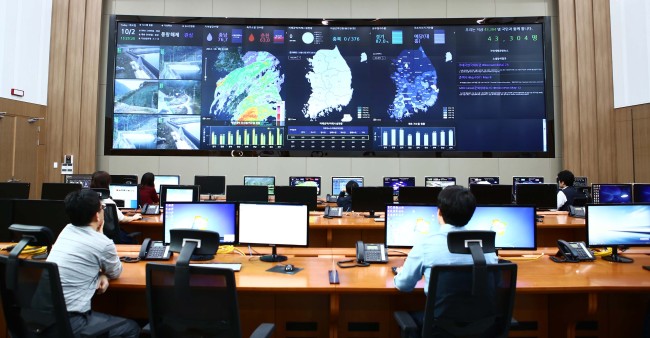Korea Rural Community Corp. vowed on Sunday to strengthen preemptive measures to secure sufficient agricultural water in drought-affected regions, seeking to raise the country’s food security.
The state-run firm has shielded the Korean farmers for the past 107 years since its launch in 1908 by providing clean water for agriculture. The KRC manages about 58 percent of the nation’s agricultural water management system.
The history of the KRC closely resonates with Korea’s agricultural modernization. Because of the country’s vicissitudes of four seasons, its role as the watchdog of agricultural water control has been crucial in safeguarding the country from recurring natural disasters, such as droughts and floods, as well as global climate change.
Last year, the northern areas of Gyeonggi Province and Gangwon Province reported only 40-50 percent of the average annual rainfall, leading to a severe shortage of water for agriculture. Anticipating another drought this year, the KRC has designated a total of 10 agricultural reservoirs ― including four in the Incheon-Ganghwa area, three in Paju, Gyeonggi Province, and three in Cheolwon, Gangwon Province ― as drought-alert zones.
 |
| KRC officials monitor the national water supply at the smart hydro management center in its newly built headquarters in Naju, South Jeolla Province. (KRC) |
Of these 10 reservoirs, the KRC has replenished eight since September last year, securing about 11 million tons of additional clean agricultural water for the possible spring drought this year. Similarly, the KRC secured additional 1.07 tons of agricultural water as of March 16, to fend off drought in the four reservoirs in Ganghwa. Last year, Ganghwa reported only 606 millimeters of rainfall, about 45 percent of the average, with the available agricultural water amounting to only 44 percent of the hydro storage capacity.
Despite the climate’s unpredictability, the KRC has been fully engaging in sorting out the potentially drought-vulnerable areas. The state-run firm has continued its preemptive operations, such as the replenishment of farming reservoirs, control over the irrigation and drainage canals, and securing alternative water sources.
“We will make utmost efforts to monitor the drought status round the clock, and continue with the preemptive drought-combat actions nationwide, so that the entire farming community can concentrate on planting rice this spring without drought concerns,” said Lee Sang-mu, president and chief executive officer of the KRC.
The KRC chief showed support for the government’s creative 3.0 slogan, seeking prosperity from the creative economy. Under his leadership, the KRC has implemented a number of the state-of-the-art information technology skills to tackle the unpredictable natural disasters and global climate change to strengthen Korea’s food security.
Starting last year, the KRC has been integrating its two core agricultural management systems ― agricultural water management and agriculture facility management ― into a comprehensive management system of hydro resources.
The tech-based system aims at “smart hydro management,” by collecting and analyzing data with the most recent information and communications technologies, in addition to creating a massive database of the country’s agricultural hydro resources. The hydro management system has a central monitoring tower to look over some 13,000 hydro utilization facilities throughout the country.
The KRC has also contributed to globally addressing the agricultural water initiatives.
To mark the 20th anniversary of the United Nations’ designation of the World Water Day on March 22, the KRC is gearing up to raise global awareness on clean water and the sustainable development of vital natural resources, at the seventh World Water Forum 2015, to be held in Daegu and North Gyeongsang Province from April 12 -17.
In September 2014, the KRC cohosted the International Commission on Irrigation and Drainage Congress in Gwangju with the Agricultural Ministry.
“We will do our best to see Korea become the world’s leading transmitter of agricultural and hydro developmental knowledge and skills,” Lee said.
By Chung Joo-won (joowonc@heraldcorp.com)

